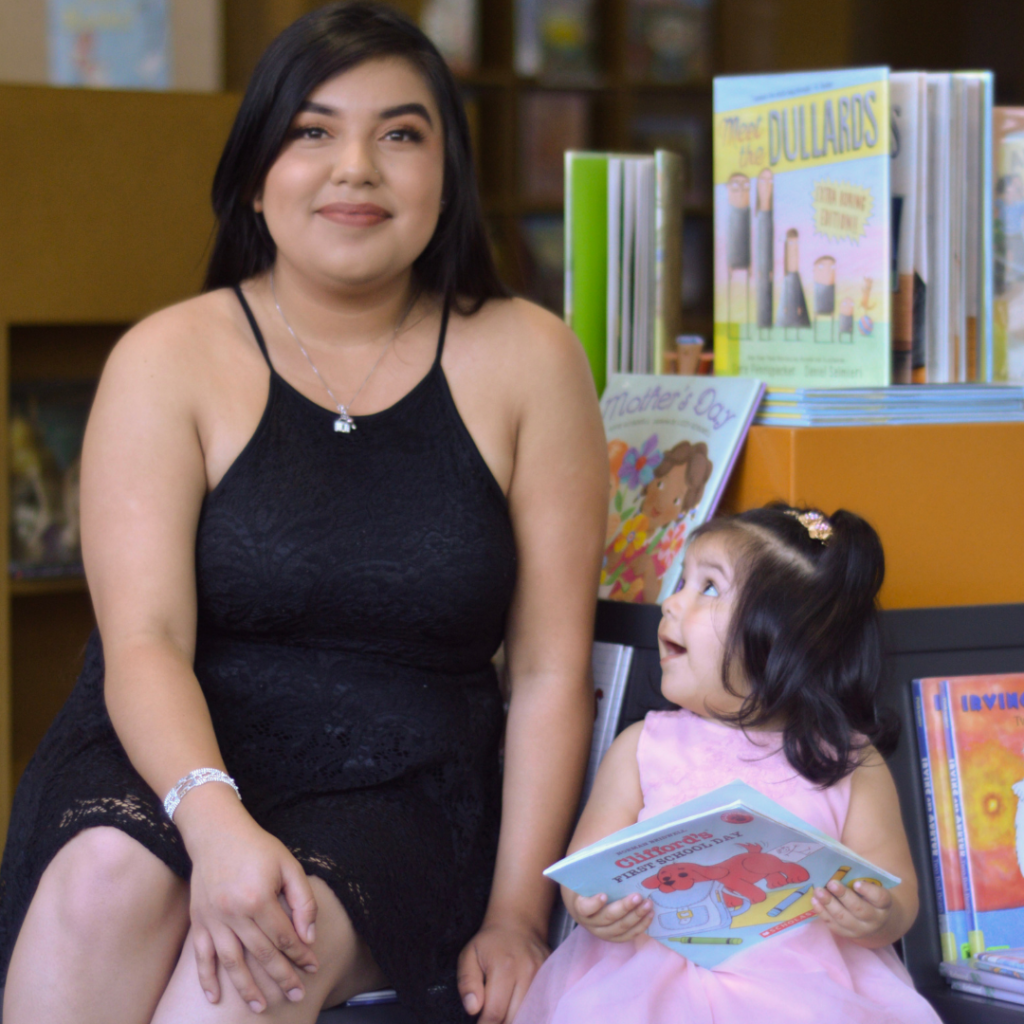Child Development Practices to Empower Young Parents

Think back to when your kids were little, would you be able to tell if they were experiencing developmental delays? Many parents don’t know what to look for to indicate if their child’s development is on or off track and as a result, don’t get connected to specialists and resources early on.
Screening for developmental delays happens most often during a child’s pediatric well-checks. Parents fill out a form with questions such as: “Can your child say five words?” and “Can your child stack five blocks?”. Then they discuss anything that may stand out with their doctor.
Teen Success, Inc. Advocates educate program participants in the stages of early child development so that they can approach their doctors with the right questions and thereby make answering these forms more effective.
Using the ASQ to Strengthen Young Mothers’ Child Development Knowledge
Family context and observation are important factors to assessing a child’s development and without knowing what your child should be able to do, it’s difficult to know what to talk to their pediatrician about. Forms miss the nuances of a child’s behavior, personality, and home environment. These are critical factors that help identify signs of what could be developmental delays.
Across the child development industry, the Ages and Stages Questionnaire (ASQ) is used to assess and support children’s development. It's a tool that supports identifying developmental delays early, so that parents can connect to professionals who can help. It measures development factors including fine and gross motor skills, communication skills, and relationship skills.
Teen Success, Inc. uses the ASQ with every one of the young families we serve. Our program has the unique advantage of one-on-one services, where our Advocates build close relationships with the young mother they’re working with and with her child or children.
Through relationship building, the Advocate gets to know both mom’s and child’s personalities, their home environment, their culture and community’s history, and what each of them needs to thrive.
The close relationship Advocates build with Teen Success participants allows them to implement the ASQ in a fun, engaging way. It is used as a tool to teach, play, practice and build relationships.
“We’re going to meet our young moms where they’re at,” says Niki Singleton, Partnership and Program Manager at Teen Success, Inc. “It’s about educating our participants about their child’s development in a way that isn’t judgmental of them or their children, we just say, ‘let’s play some games.’”
Close relationships and observation matter in early child development practices

Assessing a child's development from a place of connection let’s Advocates know what factors may be contributing or detracting from a child’s development. It could be something as simple as not having blocks at home to play with or giving moms ideas on different activities they can do to help build fine and gross motor skills. They also provide families with bilingual books and encourage moms to read to their children at least 15 minutes per day to help develop their language and literacy skills.
ASQ screenings happen over weeks of one-on-one sessions. If a child isn’t where they could be, Advocates make sure their participants have what they need at home and teach them how to do the activities.
“We take any opportunity to encourage mom and child to practice,” says Sarah Villa, Director of Impact at Teen Success, Inc. “If the child can’t do the activity the first time, we provide mom with the tools to practice and try again.”
If Advocates don’t see progression, that’s when they consult with mom and connect her to a child development professional who can make a proper diagnosis and get them the early intervention supports they need.
Our Advocates aim to connect young families to the appropriate resources before children turn 3, when they can still get services like speech and developmental therapy for free. After the age of 4, when a child is considered pre-school age, it becomes more complicated for a mother and child to receive services because they have to be connected through the child’s respective school district.
Child development from a place of connection fosters empowerment

Teen Success, Inc. approaches child development from an empowerment perspective. We believe a mother is a child’s first teacher, and for her and her child to be successful, they need the knowledge and tools to move forward.
Mommy-and-me time is an important part of our regular program too because these activities are designed to encourage a child’s development in a fun way, while their moms are learning what their children are capable of and how to help them get there.
These activities encourage parent-child bonding; it’s essential for the physical and mental regulation of hormones for mom and development for her child. When participants in Teen Success, Inc. join during pregnancy, they still get activities to help them learn about and prepare for their baby’s arrival.
Now, because of the pandemic, Advocates have transitioned to virtual facilitation of mommy-and-me time and the ASQ. They drop off both mommy-and-me kits and the materials for the ASQ at their participants’ homes and demonstrate the activities via Instagram, Facetime, and Zoom.
How the Childcare Crisis Affects Low-Income Families
CHILDCARE ACCESSIBILITY SIGNALS THE WEALTH AND EDUCATION GAP IN CALIFORNIA

62% of California’s infants and toddlers are eligible for subsidized childcare. Of those eligible, only 14% are actually enrolled in subsidized childcare (Children Now).
There is a severe lack of safe, reliable, and affordable childcare throughout California, more so since the pandemic began. A low-income teen with a child must be able to access this resource if they are ever to break the cycle of poverty for their family. They need the time to be able to go to school to invest in their future while simultaneously holding down a job to put food on the table for their children. While childcare is more readily available in high school, through district supported childcare on continuation school campuses, this availability disappears as young mothers transition from high school to post-secondary education.
This issue is exasperated when young mothers are single. Many wait months, even years, on subsidized childcare waitlists, and the majority of these do not accept infants and/or require children to be potty trained. This means that for the first two years of the child’s life, a young mom has to rely on family to help if she is to be able to make any investment in her future beyond high school. Lesly, a San Jose program participant, faced exactly this dilemma coming out of high school. She couldn’t afford to get her daughter into childcare and she didn’t feel comfortable leaving her with anyone other than immediate family. Since her immediate family all had jobs of their own, she put a pause on her college plans to be with her daughter. Now that her daughter is 3 and potty trained, she’s able to put her in pre-school part-time and that gives her time to take online college courses using the Teen Success, Inc. scholarship she received in 2019.
Teen Success, Inc. connects our participants to childcare resources in their communities. Our Advocates help them make the connections, fill out applications, and coach them through the long process of getting subsidized childcare. They help our participants plan for challenges that could affect their childcare access including transportation and learning how to potty train when their children are ready.
Childcare may be the single greatest resource working parents and student parents need – safe, reliable, affordable childcare. Because of the current pandemic, we can see more than ever the drastic disparities between affluent and low-income families. While affluent families are creating private learning pods (allowing parents to work), low-income families are losing jobs, housing, and struggling with implementing distance-learning at home.

Photo: From "The 2020 California Children’s Report Card" by Children Now. www.childrennow.org/portfolio-posts/20-report-card
When you think about what young mothers and their children need to break out of the cycle of poverty, it’s helpful to think about the problem of poverty as a domino effect.
Low-income teens make up 83% of teens who give birth. These teens rely on state subsidized childcare and help from their families in order to continue their studies; but, of all the young families served at Teen Success, accessing childcare that is safe and reliable, whether through the state or through family, has always been difficult.
20-year-old Viviana would drive over 2-hours from the Bay Area to take her daughter to be watched by her sister, leaving her overnight so that she could work during the week. When she did have state subsidized childcare, she took the bus at the crack of dawn to get her daughter there on time, or else she risked losing her spot on the roster. It was stressful and drained her of the time and energy she also needed to continue her college classes.
This domino effect drives young mothers to drop out of school, their children to fall behind in their development, and families of color to bear the weight of policies and systems that do not serve them. As we navigate our way through this pandemic season, bear in mind that some good can come out of this if we stop to consider how we might further invest in low-income communities, in families, and in creating and supporting policies that will make this generation, and every generation here after, stronger and more able to adapt successfully to the whatever challenges lie ahead.
A Young Parent's Path to Obtaining a Living Wage

High school education alone is not enough to earn a living wage.An educated woman is a powerful woman, but when a woman is also a mother, we also know that her opportunities (or lack thereof) will directly impact her children too.
We work with young mothers because stigma surrounding teen pregnancy is an additional barrier to obtaining a living wage. We can help them overcome those barriers so they will be able to persist with their education and create an avenue for her child to follow in her footsteps.
Parenting teens are one of the youth populations at highest risk for not finishing their high school education or pursuing a post-secondary education. Only 38% of young mothers graduate from high school and less than 2% of them complete college by the age of 30.
In California, those who don’t graduate from high school earn annually less than half of the amount considered the state’s living wage of $57,096. The challenges for young mothers who do graduate from high school often increase as they work to pursue their post-secondary education. Many support systems stop after high school graduation. Affordable and quality childcare, which may have been offered on high school campuses, now presents a tremendous barrier as most colleges don’t have childcare on campus.
As young women of color, our participants have even more barriers to overcome in continuing their education. Only 28% of Black students and 33% of Latinx students graduate college or are career-ready, as compared to 48% of White students and 57% of Asian students (Children Now). Teen Success, Inc. is expanding our work to ensure we can partner with young mothers as they overcome these challenges to their education, while also nurturing their child’s growth.
Teen Success, Inc. is now supporting all members through the completion of a post-secondary degree or certificate that will lead to a living wage. In this new post-secondary phase of our work, our participants will:
- Explore their post-secondary education options through visits to local community college campuses and career fairs;
- Have support as they work on their applications for admissions, financial aid, and scholarships;
- Continue to have their coaching sessions with their Advocate to mitigate barriers and ensure consistent school attendance;
- Participate in financial literacy workshops and training, and
- Continue developing their parenting skills so their children grow and thrive right alongside them.

As members begin their post-secondary studies, they will also be provided with educational stipends to help financially support them as they persist in their education. Studies have shown that educational stipends are the most equitable way to support students of color and give them the power to decide how to best use this support to further their education.
Press Release JUL 28: New Silicon Valley Influencers Lead Teen Success, Inc. Board of Directors

FOR IMMEDIATE RELEASE: DOWNLOAD
Tuesday, July 28, 2020
Media Contact: Becka Ross | (408) 263-8330 x105 | bross@teensuccess.org
New Silicon Valley Influencers Lead Teen Success, Inc. Board of Directors
Silicon Valley influencers and veterans, Ellen Moir and Madanno Bolano, succeed former Apple executive Nancy Heinen as Co-Chairs of Teen Success, Inc.
(MILPITAS, CA) – Teen Success, Inc. announces incoming Board Co-Chairs, Madonna Bolano and Ellen Moir, succeeding Nancy Heinen’s four years of service as Board Chair. Madonna Bolano has served on the Teen Success, Inc. Board since January 2018 and is a 25+ year executive veteran of Silicon Valley who retired from her global leadership role of Human Resources at Applied Materials and its 20,000+ employees. Once a young mother herself, Bolano brings her personal experience and knowledge to Teen Success, Inc. to move forward the work of strengthening young families through education. “I’m passionate about supporting the education and development of young families and thrilled to have this opportunity to take my commitment to the next level,” says Bolano.
Ellen Moir has served on the Teen Success, Inc. Board since its founding in 2011 by former California State Senator Becky Morgan. As Founder and former CEO of New Teacher Center, and Silicon Valley Women of Influence nominee, Moir brings her expertise in pursuing educational equity and scaling nonprofit work. “I’ve been on the Board since the very beginning and can attest to Teen Success, Inc.’s impact on breaking the cycle of poverty for young families. I’m honored to have the opportunity to continue my involvement and support for young mothers and their children,” says Moir.
As Co-Chairs, Bolano and Moir will lead Teen Success, Inc.’s work in supporting young families through the COVID-19 pandemic, ensuring they continue on their educational paths. “I know that in partnership with these two incredible leaders, we will continue to build on our strong foundation and increase our impact for young families in California,” says Karin Kelley, Teen Success, Inc.’s Executive Director.
Nancy Heinen, former Senior Vice President at Apple, Inc. in Silicon Valley, leaves her role as Board Chair for four years at Teen Success, Inc. having doubled the program’s size in San Jose and grown the number of young mothers served in Salinas, Sacramento, and Fresno. “It has been an amazing experience getting to work with such incredible young mothers and being a part of their journeys,” says Heinen. She looks forward to next phase of leadership for the organization and supporting Bolano and Moir in their new roles.
About Teen Success, Inc.: Teen Success, Inc., a 501(c)3 nonprofit located in the Silicon Valley, builds pathways to prosperity for two generations—young mothers and their children – across California. Teen Success, Inc. empowers young mothers to complete high school and persist through post-secondary education while nurturing their child’s positive development to ensure the success of the whole family. Since its founding in 2011 by former State Senator Becky Morgan, Teen Success, Inc. has supported over 1,500 young families across California.
A philanthropist's action list to support Black Lives Matter
(Updated 6-30-20)
We're outraged by the deaths of George Floyd, Breonna Taylor, Ahmaud Aubery – but just saying that, it’s simply not enough. To say that we're heartbroken for George’s wife and daughter – it’s not enough. We're grieving their loss and angry for having to do so, but, that's not enough.
We've been fighting for social justice for young mothers and it's time for a reckoning.
It might seem like educational equity is a different fight than the Black Lives Matter movement, but it isn't. We can't continue to sidestep the fact that ending the cycle of poverty won’t happen without also dismantling the institutions and policies that keep Black communities trapped.Click read more to find a list of resources and book mark this page, we'll be updating it regularly.
At the core of every social justice issue we fight for, including educational inequity, is the fight against racism.
We have work to do so that not one more Black mother has to mourn the loss of her child and that no more Black children have to ask why their parents were killed.
We’ve seen how racism and prejudice impact our young mothers, how generation after generation inherit its negative consequences - how they inherit poverty. Healing the trauma and addressing racism head on means we have to step up and stop the spread of racism in our everyday lives.
We're the ones being called on right now, because we're the ones privileged enough to vote and the ones with the resources to make an impact. We can't put the fight on the next generation or solely on our Black communities, it’s us, here and now.
We must address every barrier young families face, most importantly racial inequality; because without it, we'll continue to see racism and bias limit their potential. Racism must end with us, so that every child in every future generation can thrive.
The fight against racism didn’t start with us but it can and needs to end with us.
This is what we're doing at Teen Success to turn our outrage into positive change:
- Standing in support of all Black people and the Black Lives Matter movement.
- Calling out injustice and demanding that our systems change.
- Having difficult conversations in our homes, in the office, and looking closely at our own biases as individuals and as an organization to identify what we need to change.
- Identifying how we can use our voice and privilege more powerfully to fight racism and oppression in all its forms.
- Building social justice education into our program curriculum so that young mothers can advocate for themselves and their communities more effectively.
A Philanthropist's Resource List to Support Black Lives Matter
Donate to African-American led organizations fighting for racial equality
Studies show that Black led organizations are often the least funded. Invest in their work and elevate the voices of Black-led organizations making change. Here is a starting list of some potential organizations to donate to:
- Minnesota Freedom Fund - Since 2016, MFF’s mission has been to pay criminal bail and immigration bonds for those who cannot afford to, as they seek to end discriminatory, coercive, and oppressive money bail.
- The NAACP Legal Defense and Educational Fund, Inc. is America’s premier legal organization fighting for racial justice. Through litigation, advocacy, and public education, LDF seeks structural changes to expand democracy, eliminate disparities, and achieve racial justice in a society that fulfills the promise of equality for all Americans.
- Equal Justice Initiative (EJI) is committed to ending mass incarceration and excessive punishment in the U.S., challenging racial and economic injustice, and protecting basic human rights for the most vulnerable people in American society.
- Our partner, Alliance for Girls, has posted a list of Black led organizations focused on women and girls in the Bay Area.
Embrace difficult conversations and avoid assumptions about race, oppression and equity
Though you may not know what to say, research it, share what you learn, engage in conversation, and stay open to learning from others. Here are some helpful resources to get started (if you're interested in purchasing any of the books listed below click here to find a Black-owned bookseller to purchase from).
- Resources for adults
- Critical Conversations: Dr. Robin DiAngelo on White Fragility and Why It's So Hard for White People to Talk About Racism (Article)
- Me and White Supremacy by Layla F. Saad
- Racial Equity Tools Glossary
- What is systemic racism? (Video by ACT.TV)
- White Fragility by Robin DiAngelo
- Podcast: Notice the Rage, Notice the Silence
- Resources for sharing with children and young adults
- Separate is Never Equal: Sylvia Mendez (Read aloud video)
- Little Leaders: Bold Women in Black History and Little Leaders: Exceptional Men in Black History
- The Hate U Give by Angie Thomas
Commit to being anti-racist in your public and private life
It’s a privilege to educate ourselves and others about systemic racism, instead of experiencing it first-hand.
Examine your bias
Everyone is biased in one way or another. Acknowledging it is the first step in overcoming it.
Vote and demand more from your civic leaders
Choose leaders who will dismantle racist policies and reform police practices. Don’t stop at voting, write and call local and state officials to demand they take action now. Then check out the work Emerge America is doing to get women leaders of color into office.
Keep the conversation going beyond the media attention
Let's have more conversations on racism and inequity affecting our communities and if you're already taking action for racial justice, especially for youth, let us know in the comments below so that we can do better too.
For now, we leave you with this quote from Bryan Stevenson, “The opposite of poverty is justice.”
Listening, learning, and taking action.






